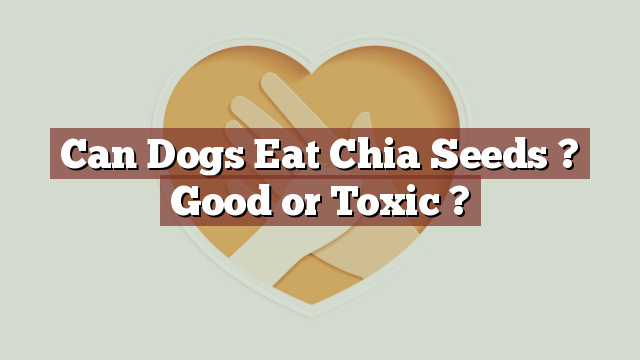Can Dogs Eat Chia Seeds? Good or Toxic?
Knowing which foods are safe for our furry companions is crucial for their overall well-being. Dogs have different dietary needs than humans, and it’s important to understand what foods are suitable for them. One such food that has gained popularity in recent years is chia seeds. But can dogs safely consume chia seeds, or are they potentially toxic? Let’s delve into the nutritional value of chia seeds and explore if they are safe for our canine friends.
Nutritional Value of Chia Seeds: An Overview
Chia seeds are small, oval-shaped seeds derived from the Salvia hispanica plant. They have been consumed for centuries and are known for their impressive nutritional profile. Chia seeds are rich in essential nutrients such as omega-3 fatty acids, protein, fiber, antioxidants, and minerals like calcium and manganese. These seeds are often praised for their potential health benefits in humans, including aiding digestion, promoting heart health, and supporting weight management.
Can Dogs Eat Chia Seeds? Safety and Toxicity Explained
Can dogs eat chia seeds? The answer is yes, dogs can eat chia seeds in moderation. Chia seeds are not toxic to dogs and can be a healthy addition to their diet. However, it is essential to introduce them gradually and in small quantities to avoid any digestive upset.
While chia seeds are generally safe for dogs, it’s crucial to consider their overall diet. Consult with your veterinarian before incorporating chia seeds into your dog’s meals, especially if your pet has specific dietary restrictions or underlying health conditions. Additionally, keep in mind that chia seeds should not be the primary source of nutrition for dogs and should only be treated as a supplement.
Potential Risks or Benefits of Feeding Chia Seeds to Dogs
Feeding chia seeds to dogs can have potential benefits. The omega-3 fatty acids in chia seeds can support a healthy coat and skin, while the fiber content may aid digestion. Chia seeds are also believed to possess anti-inflammatory properties, which can be beneficial for dogs with joint issues or certain inflammatory conditions.
However, it’s important to remember that moderation is key. Consuming excessive amounts of chia seeds can lead to digestive problems such as bloating or diarrhea. Some dogs may also have allergic reactions to chia seeds, although such cases are rare. Monitoring your dog’s response to chia seeds and adjusting the portion size accordingly is crucial to ensure their well-being.
What to Do if Your Dog Consumes Chia Seeds: Expert Advice
If your dog accidentally consumes chia seeds, there is no need to panic. In most cases, a small quantity of chia seeds should not cause any harm. However, if you notice any unusual symptoms such as gastrointestinal distress, vomiting, or lethargy, it is recommended to consult your veterinarian immediately. They will be able to assess the situation and provide appropriate guidance based on your dog’s specific circumstances.
Conclusion: Chia Seeds in Moderation Can Be a Healthy Addition
In conclusion, chia seeds can be a safe and nutritious addition to your dog’s diet when fed in moderation. Their rich nutritional profile makes them a potentially beneficial supplement, offering omega-3 fatty acids, protein, fiber, and various minerals. However, it is crucial to introduce chia seeds gradually and monitor your dog’s response. As always, consulting with your veterinarian before making any dietary changes is highly recommended to ensure the well-being of your four-legged friend.
Thank you for investing your time in exploring [page_title] on Can-Eat.org. Our goal is to provide readers like you with thorough and reliable information about various dietary topics. Each article, including [page_title], stems from diligent research and a passion for understanding the nuances of our food choices. We believe that knowledge is a vital step towards making informed and healthy decisions. However, while "[page_title]" sheds light on its specific topic, it's crucial to remember that everyone's body reacts differently to foods and dietary changes. What might be beneficial for one person could have different effects on another. Before you consider integrating suggestions or insights from "[page_title]" into your diet, it's always wise to consult with a nutritionist or healthcare professional. Their specialized knowledge ensures that you're making choices best suited to your individual health needs. As you navigate [page_title], be mindful of potential allergies, intolerances, or unique dietary requirements you may have. No singular article can capture the vast diversity of human health, and individualized guidance is invaluable. The content provided in [page_title] serves as a general guide. It is not, by any means, a substitute for personalized medical or nutritional advice. Your health should always be the top priority, and professional guidance is the best path forward. In your journey towards a balanced and nutritious lifestyle, we hope that [page_title] serves as a helpful stepping stone. Remember, informed decisions lead to healthier outcomes. Thank you for trusting Can-Eat.org. Continue exploring, learning, and prioritizing your health. Cheers to a well-informed and healthier future!

